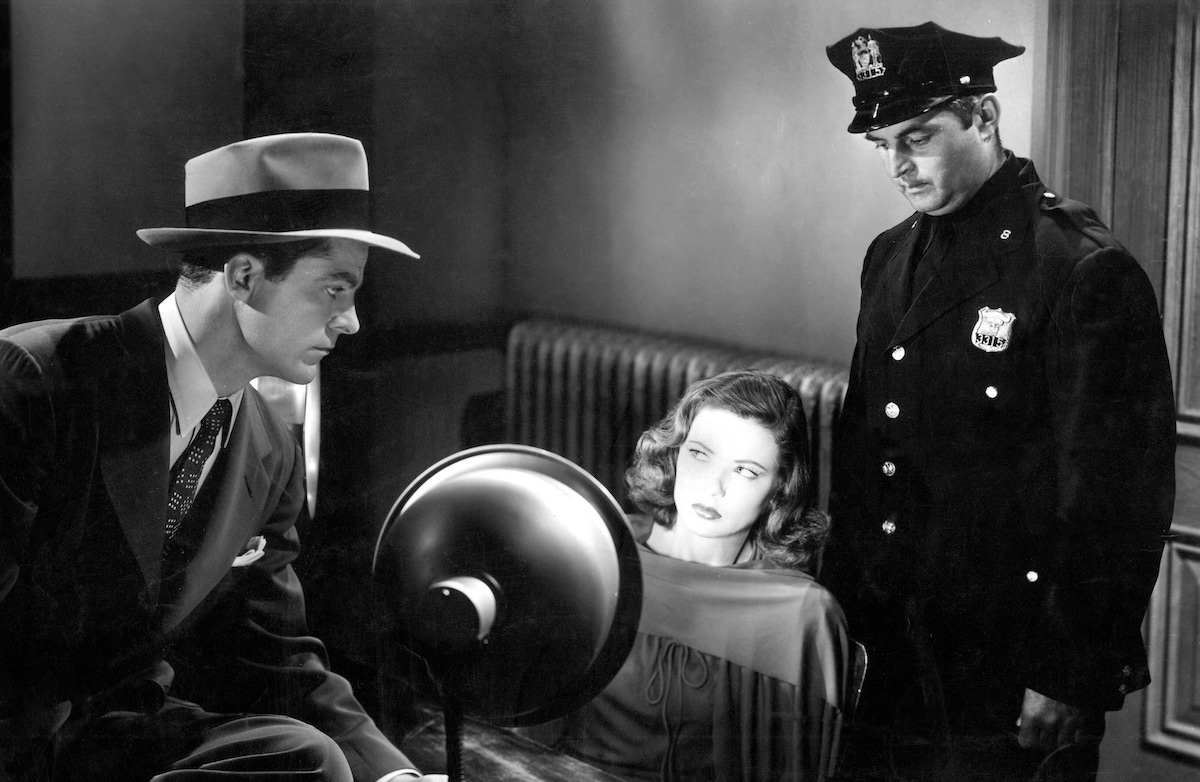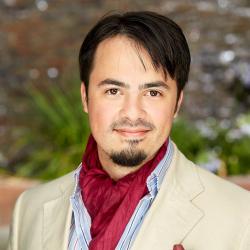I will close this series on film noir with Laura, because it’s altogether more beautiful and it has something of a happy ending. In being the most beautiful noir, it also involves the most sophisticated reflection on beauty in its relation to American society and to tragedy. It is a rare case where the murderer and the victim are in love, in a way, and therefore shows the most astonishing contradiction in characterization, the most impressive puzzle to fit together, if we are to understand what noir tries to teach about American character. It’s also the most political noir—instead of looking at the criminal underworld or outcasts, it looks at the glamour of Manhattan.
Most of the first part of the movie is narrated by the murderer, Waldo Lydecker, played by Clifton Webb in his finest performance on film, in answer to a cop’s question about the death of Laura Hunt, played by the angelic beauty Gene Tierney, who had been his protégé. It’s a long weekend at the end of summer, New York is too hot to bear, and this sensational murder of an innocent, glamorous beauty is attracting a lot of attention in the press. What’s America coming to?
Waldo is an incredibly sophisticated man, as shown by the fact that he claims to wish to be suspected of the murder, rather than feeling indignant, as most would, as a sign of respect to his intelligence, since his morality isn’t worth mentioning. To respect intelligence obviously means also to fear what it might do. Waldo’s the American media elite, a columnist with a popular radio show—he teaches Americans about culture, which he wishes to embody. His Roman villa of an apartment atop a Manhattan skyscraper is an art museum—this is what American wealth has built, the new Monticello, atop Wall Street, if you allow a joke. Waldo will make America as sophisticated as himself or go mad trying; millions of people hang on his words and he’d like to think the future of America depends on him.
His Laura was a small-town girl who made her career in the city, in advertising. A beautiful woman, she sells beautiful visions to the rest of us, who are neither beautiful nor able to bear a life without beauty. Maybe we can buy things and improve our private lives in the assurance of an almost public authority—advertising, after all, tells us either that prestige or popularity attaches to some object, guaranteeing that we have either quality or quantity on our side when we make our choices. Advertising tells us what to do with our uncertain lives—to have the lives of the people who make commercial endorsements, that is, our betters. Advertising re-creates aristocracy within democracy, since we have money to spare. Maybe it’s competitive flattery, with the correspondent contempt of people beneath our ability to buy or enjoy.
Laura wishes to do more or less what Waldo does—he advertises culture, not commerce, but the difference may not matter. He certainly is offended by people misquoting him, he says. As a man of enlightenment, the powerlessness of his words is worse than death. This seems to be why he falls in love with Laura and eventually kills her. She is the ideal material for him to shape into an elegant lady, someone who could, if not match him, then at least complement him. Words are not enough, love is also necessary, which also starts from a beautiful vision. The problem, of course, is that to love him, she would have to believe him good for America, not just good for her, and this is impossible. He is more a museum piece than a man and altogether unfit for life in a democracy.
In a strange way, therefore, Waldo is confessing to murder while trying to exculpate himself as a sincere, rejected lover, that is, a selfless benefactor. It’s ironic that a man of words cannot hear himself talking, but that’s why we have an unusually gifted audience, a man as ambitious in his own way, Mark McPherson, the Irish cop who made lieutenant detective, played by Dana Andrews. He’s a man of the people, as his little gimmick baseball game suggests, but he is a man of finesse, not force—the game is all about balance, he says, and it keeps a man’s nerves under control. He has a good memory, an unsentimental attachment to the work of doing justice in the name of the people, and a kind of intelligence that comes with facing many ugly things, including personal danger.
Mark falls in love with this woman whose murder he’s supposed to investigate. This seems crazy, but it’s remarkably plausible. First, he has to take her seriously as a person to want to do justice to her; secondly, the more he learns about how good and generous she was, the more he finds evidence that man does not live by bread alone, but that there is something in us, the soul, and it cannot die with us. Justice and divine providence pop up in his prosaic New York life and are almost enough to drive him crazy. He needs a miracle, another aspect of the beautiful, beyond advertising and falling in love, more tied to the way Mark is himself beautiful—that is his noble hero’s story, taking bullets trying to save his fellow policemen from a murderer.
He does get his miracle—another Laura shows up, who is not quite what people say of the dead woman. She turns out to be capable of deception and, indeed, very willful—in short, an intelligent woman but not obviously trustworthy. Even her innocence is now a problem, since it means she is unable to take seriously the evil showing itself in the attempt to murder her; justice for the woman murdered in her guise is not of great interest to Laura. The shocks keep coming to Mark.
This is one of two strange transformations—the professorial Waldo, who seems cool and detached, a perfect WASP in name and dress, turns out to be a raving lunatic. As an artist, he made a Laura without whom he cannot live. Love has taught him death is preferable to loneliness, which he had endured recklessly before. He wishes to prove man is not merely flesh by committing a murder, by a commitment that goes beyond any legal or natural limits. He ends up believing in the words of romantic poets, in short, while claiming the cynic’s freedom from illusions.
Mark the cop starts a cynical man who claims the dead have no privacy, as though neither shame nor funerals were known to the public authorities of New York—I suppose that makes sense in Enlightenment terms, denying there is anything holy in our lives. He is contemptuous of women, too. He transforms into a passionate lover risking everything to save a woman he had thought lost to him before they met, who turns out to be most in danger when he thinks he has assured her safety. The limits of his considerable powers of thinking and getting things done need to be impressed on him before he can love, so to speak, without idolatry or impiety. After all, it was somehow miraculous that he found someone who might love him.
These contradictions are reconciled through beautiful storytelling that reveals one character out of different appearances. Conflict reveals the soul even as it denies our most beautiful wishes. Laura herself transforms, by becoming serious, preferring a man of deeds to one of speeches, no longer satisfied with making images, perhaps less dangerous to America once she realizes how dangerous her beauty really is. Unlike all the other beautiful women in this series of movies, Laura doesn’t use her powers to deceive people, but realizes instead that to some extent she herself had been deceived—the world isn’t really so beautiful, we just treat beauty as a privilege, which protects these charmed creatures from some of the harsh things in life. This young woman coming to adulthood is an image of everything impersonated by the other beautiful women, of what the doomed men were looking for—a consoling grace.

